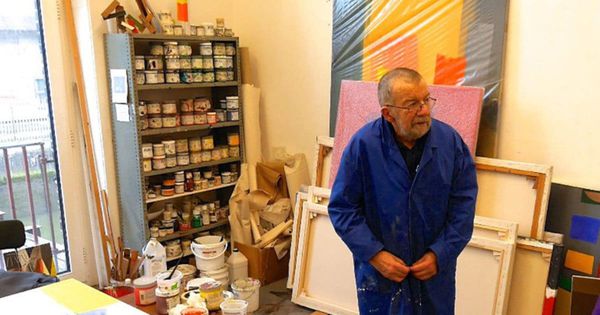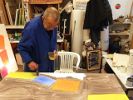Eye For Film >> Movies >> Which Way Up (2017) Film Review
Which Way Up
Reviewed by: Jennie Kermode

John McLean is a painter much loved in the UK, a lover of colour and form whose works seem to be imagined as they are created, part of an ongoing process of experimentation. Watching him at work in Michael Proudfoot's documentary, one gets the impression that the process is as much physical as intellectual. But McLean has been diagnosed with Parkinson's disease and is gradually losing his ability to control the tremor in his hands. We observe him here at a critical point in his career, when he could be producing his final works or could be transforming creatively as he is physically.
Like McLean's work, this documentary was allowed to develop naturally, with only the simplest of plans in advance. There was no knowing what might happen during filming, and although there are in fact no major events captured in the result, that journey, that process of change is as much a part of it as of the artist himself. There are echoes of Gerhard Richter painting in the way the film explores technique, though with the focus more on observation and less on the discussion of technical detail. The fluid way in which McLean develops his colours and layers them over one another says something about the mystery many find in his work. Here, what might at first appear to be a block of primary colour is never that simple. On closer viewing, complex textures emerge. Furthermore, there might be something quite different hidden under the surface - a remnant of an idea that didn't work. McLean's process is full of mistakes, abandoned things, and one gets the feeling that it has always been so. He owns these errors, learning from them; like all great artists, he is actutely aware of himself as an unfinished work.

Though he curses at uncooperative materials, McLean comes across as a good humoured man whose illness has done nothing to deplete the joy that he takes in the world. There's a brief awkward moment when he says that he would charge extra to anyone who voted for Scottish independence, and describes such people (a hefty proportion of his countrymen) with a bitterness that seems at odds with the thoughtful ambiguity of his work; it's the exception that probes the rule in a film whose ambience is otherwise decidedly positive. If anything, the artist seems too intently focused on the process of creation to have time to worry about the new difficulties he faces. One never sees him hesitate due to a shortage of ideas - instead, he seems to act on instinct, solving problems in retrospect whilst the next set of possibilities unfurls in his mind.
There's no real conclusion to this documentary, and that is to its credit. It's all about the journey.
Reviewed on: 24 Mar 2018















